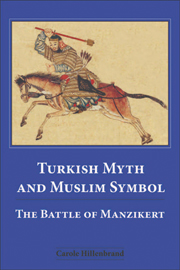Book contents
- Frontmatter
- Contents
- List of figures
- List of plates
- Acknowledgements
- Comment on transliteration and conventions used in the book
- Dedication
- Part 1 Medieval Muslim interpretations of the battle of Manzikert
- Part 2 The legacy of the battle
- 6 The ongoing Muslim–Christian confrontation: the victorious contribution of the Turks
- 7 The heritage of Manzikert: the myth of national identity
- Conclusion
- Appendix A The account of the battle of Manzikert by Michael Attaleiates, translated by Ruth Macrides
- Appendix B Translations of some other medieval Christian accounts of the battle of Manzikert
- Appendix C Other medieval Muslim accounts of the battle of Manzikert
- Bibliography
- Index
- Plate section
7 - The heritage of Manzikert: the myth of national identity
from Part 2 - The legacy of the battle
Published online by Cambridge University Press: 05 August 2013
- Frontmatter
- Contents
- List of figures
- List of plates
- Acknowledgements
- Comment on transliteration and conventions used in the book
- Dedication
- Part 1 Medieval Muslim interpretations of the battle of Manzikert
- Part 2 The legacy of the battle
- 6 The ongoing Muslim–Christian confrontation: the victorious contribution of the Turks
- 7 The heritage of Manzikert: the myth of national identity
- Conclusion
- Appendix A The account of the battle of Manzikert by Michael Attaleiates, translated by Ruth Macrides
- Appendix B Translations of some other medieval Christian accounts of the battle of Manzikert
- Appendix C Other medieval Muslim accounts of the battle of Manzikert
- Bibliography
- Index
- Plate section
Summary
It is claimed that religious unity is also a factor in the formation of nations, whereas we see the contrary in the Turkish nation. Turks were a great nation even before they adopted Islam. This religion did not help the Arabs, Iranians, Egyptians and others to unite with Turks to form a nation. Conversely, it weakened the Turks' national relations; it numbed Turkish national feelings and enthusiasm. This was natural, because Mohammedanism was based on Arab nationalism above all nationalities.
(Atatürk)The aims of the chapter
It is important to bring the subject of this book, if only modestly, up to the present day. The following discussion will show the versatility of the myth of Manzikert and how a battle fought in the eleventh century could serve as a key symbol in the formation of the new Turkish Republic almost a millennium later. It will demonstrate how the Islamic credentials of the Seljuq Turks, so stressed and exploited in the medieval accounts of the battle, could give way to an emphasis on the ‘Turkishness’ of the Seljuqs in a new and strongly nationalist political context. It is also of considerable interest to focus for a while on the contribution of modern Turkish scholars to the field of Seljuq history, and more generally, the themes addressed in this book. Their work is almost always ignored by western scholars of medieval Islamic history.
- Type
- Chapter
- Information
- Turkish Myth and Muslim SymbolThe Battle of Manzikert, pp. 196 - 225Publisher: Edinburgh University PressPrint publication year: 2007



